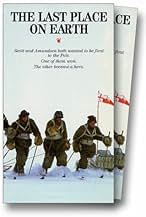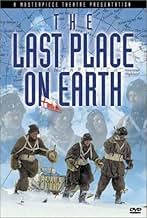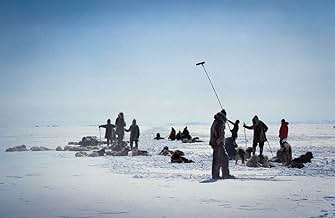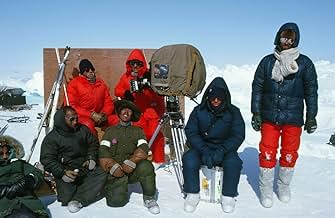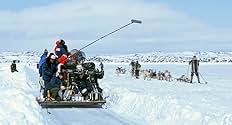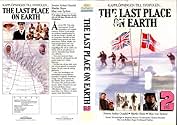Ajouter une intrigue dans votre langueBased on the book 'Scott and Amundsen' by Roland Huntford, "The Last Place on Earth" is an exploration of the rivalry between Captain Robert F. Scott and Ronald Amundsen as they attempt to r... Tout lireBased on the book 'Scott and Amundsen' by Roland Huntford, "The Last Place on Earth" is an exploration of the rivalry between Captain Robert F. Scott and Ronald Amundsen as they attempt to reach the South Pole.Based on the book 'Scott and Amundsen' by Roland Huntford, "The Last Place on Earth" is an exploration of the rivalry between Captain Robert F. Scott and Ronald Amundsen as they attempt to reach the South Pole.
Parcourir les épisodes
Avis à la une
Still splendid TV but the debate on Scott has moved on. After the glorifying of the early years to buoy up a country stunned by the losses of the Boer War came the debunking by Huntford. Since then there have been many novels questioning his motives, principally by Sir Ranulph Fiennes and Susan Solomon. I have just read David Crane's excellent book which, at last, seems to provide a balanced account of a remarkable man, rooted in Victorian values but with an enquiring and open mind ahead of his time. If your interest is piqued by this film there are books galore on Scott for you to read to explore the debate for yourselves. You can even try to find The Race by Kare Holt "a writer as determined to rubbish Amundsen's reputation as Huntford was to rubbish Scott's". All in all good entertainment, especially for those who love a good anti-English polemic a la Braveheart, but don't confuse this with the truth.
Roland Huntford's definitive saga of polar exploration, "Scott and Amundsen", is brought very faithfully to film in this 7-episode BBC series. Huntford was the former Scandinavian correspondent for London's "Observer", and his book was the first to debunk Scott's supposed heroic martyrdom.
Beautiful cinematography and several very solid performances by Sverre Anker Ousdal as the introspective and driven Amundsen; Martin Shaw nails the effete martinet, Scott; Michael Maloney is great as Scott's betrayed 2nd Officer, Teddy Evans; Toralv Maurstad as the outspoken Norwegian polar veteran, Hjalmer Johanssen; and, Richard Morant as, W.E.G. Oates, the army officer in a Navy environment and apparently the only man in Scott's party capable of independent thought.
Beautiful cinematography and several very solid performances by Sverre Anker Ousdal as the introspective and driven Amundsen; Martin Shaw nails the effete martinet, Scott; Michael Maloney is great as Scott's betrayed 2nd Officer, Teddy Evans; Toralv Maurstad as the outspoken Norwegian polar veteran, Hjalmer Johanssen; and, Richard Morant as, W.E.G. Oates, the army officer in a Navy environment and apparently the only man in Scott's party capable of independent thought.
10JANA-7
Roland Huntford's meticulous and exhaustive research of Scott and Amudsen's Antarctic exploration efforts for winning the South Pole help make the making of this film a Directors dream and challenge. Outstanding cinematography and period costume design push this great story to the highest level of viewing. The film should be mandatory viewing for all highschoolers. The historical and geographical values will enhance ones knowledge of this very special period of Antarctic exploration in the early 1900s. The British and Norwegian actors perform their skills with convincing emotion. The film, based on Huntford's documentary brilliance, gives us all time to ponder what really happened in claiming the South Pole and lays to rest a good deal of sentimental nonsense,which some of us were subjected to during our high school days.
I have spent 45 years or more reading Arctic and Antarctic histories and I'm famiiar with most of the important written works on these subjects. I believe it's generally unfair to compare the Amundsen and Scott expeditions of 1911-12. Amundsen set one objective: to be the first to reach the south geographuc pole. This too was A Scott's objective but he other goals too. Scott didn't go south with the expectation of being in a race to the South Pole but arriving in Melbourne he found himself in just such a race. It was a race that he unfortunately could never win. This film explains why.
I don't like denigrating a supremely brave man, even if Scott was arrogrant, over-confident, not an effective leader, and poorly organized owing to the former attributes. Scott's Royal Navy career was prematurely curtailed when Sir Jackie Fisher, First Sea Lord, held him responsible for a ship's collision. Fisher told Scott that he would receive no further promotions and that was that. Early in his naval career, Scottw was befriended by Sir Clement Markham, head of the Royal Geographic Society, and Markham encouraged Scott to apply to lead what would become known as the 'Discovery Expedition'. Markham didn't like Sir Ernest Shackleton, especially after the latter nearly died on Scott's trip south in 1901-02, and therefore never seriously backed Sir Ernest's Antarctic efforts. Scott, with Markham's full support, undertook the 'Terra Nova Expedition: Markham, in effect, determined who received RGS backing and who gained government support. Without Markham's backing Scott likely never would have had a second expedition. Scott's competence, or lack there of, was never really at issue: Markham was Scott's great enabler.
Scott by temperment and training was not an explorer. He began exploring after his chosen career in the RN was prematurely ended. Amundsen was a professional explorer, inspired by Nansen's trek across Greenland in the 1880s and the subsequent 'Fram Drift' in the Arctic in the early 1890s. Amundsen became an excellent Nordic skier in hus teens and he began his exploring career with the Belgian Antarctic Expedition in the late 1890s, where he spent a year ice bound off the Antarctic Peninsular (he met Dr. Fredrick Cook at this time). A few years later, Amundsen led an expedition to locate the North Geomagnetic Pole. He successful mastered the science needed to do this, spending .3 years in the Canadian Arctic. At this time, Amundsen learned Arctic survival from the Inuit and in 3 years his men never suffered the physical deprevations so common to other Arctic explorers. He helped solve the riddle of the Sir John Franklin expedition on the 1840s, traversed the Northwest Passage, and then forced to winter at Herschel near the MacKenzie River Delta. He undertook a 1200 mile round trip on skis over the Brooks Range to telegram his backers of his discoveries. My point: Amendsen was not an amateur explorer, it was his profession.
Huntford's facts speak for themselves and no recent resesrch can reasinably deny them. Scott was a brave man but then so was Amundsen. Amundsen was a natural self-promoter with a huge ego but these aren't relevant to the man's competence. Scott simply wasn't in Amundsen's league as an explorer. Scott wasn't in the same league as Sir Ernest Shackleton or Sir Douglas Mawson. Scott was out of his depth, too proud to see it, and he led his men into catastrophe. This very nearly happened to Sir Ernest 3 years later. Shackleton was however, a great and inspirational leader so when disaster hit, he led his men to safety against all odds. Anyone interested in an account of just part of Shackleton's Transantarctic Expedition 1914-17 might read F.A.. Worselley's 'Shackleton's Boat Journey'. Another incredible story of Antarctic survival is 'Mawson's Will' concerning Sir Douglas's recovery from near disaster in Adelie Land in the late teens.
Scott and his mean didn't have to die horribly. It occurred because Scott made poor decisions as a leader, refused the sound of advice of experts when given, and he entrusted his future and that of his men to luck and the well known British Imperial spirit. Sadly, he ran out of luck, and in Antarctica no amount of indominability can overcome nature. I really don't believe that Scott fully appreciated the risks he took. Oh, he knew there were ricks but he honestly believed his wil (and some luck!), could overcome any obstacle he faced. He gambled and he lost. Amundsen fully understood polar life and he did everything possible to minimize risk. He didn't rely on luck or pluck but sound planning and preparation. He chose his men well, he bet his financial future on this expedition, survived, and won his bet. Amundsen's men gained weight on their trip to the pole and back. This movie explains what occurred and offers a glimpse why. Amundsen went on to sail though the Northeast Passage (second man to do it), and in the late 1920s, helping to search for the Italia Expedition of Nobile', Amundsen dies in the Arctic.
I don't like denigrating a supremely brave man, even if Scott was arrogrant, over-confident, not an effective leader, and poorly organized owing to the former attributes. Scott's Royal Navy career was prematurely curtailed when Sir Jackie Fisher, First Sea Lord, held him responsible for a ship's collision. Fisher told Scott that he would receive no further promotions and that was that. Early in his naval career, Scottw was befriended by Sir Clement Markham, head of the Royal Geographic Society, and Markham encouraged Scott to apply to lead what would become known as the 'Discovery Expedition'. Markham didn't like Sir Ernest Shackleton, especially after the latter nearly died on Scott's trip south in 1901-02, and therefore never seriously backed Sir Ernest's Antarctic efforts. Scott, with Markham's full support, undertook the 'Terra Nova Expedition: Markham, in effect, determined who received RGS backing and who gained government support. Without Markham's backing Scott likely never would have had a second expedition. Scott's competence, or lack there of, was never really at issue: Markham was Scott's great enabler.
Scott by temperment and training was not an explorer. He began exploring after his chosen career in the RN was prematurely ended. Amundsen was a professional explorer, inspired by Nansen's trek across Greenland in the 1880s and the subsequent 'Fram Drift' in the Arctic in the early 1890s. Amundsen became an excellent Nordic skier in hus teens and he began his exploring career with the Belgian Antarctic Expedition in the late 1890s, where he spent a year ice bound off the Antarctic Peninsular (he met Dr. Fredrick Cook at this time). A few years later, Amundsen led an expedition to locate the North Geomagnetic Pole. He successful mastered the science needed to do this, spending .3 years in the Canadian Arctic. At this time, Amundsen learned Arctic survival from the Inuit and in 3 years his men never suffered the physical deprevations so common to other Arctic explorers. He helped solve the riddle of the Sir John Franklin expedition on the 1840s, traversed the Northwest Passage, and then forced to winter at Herschel near the MacKenzie River Delta. He undertook a 1200 mile round trip on skis over the Brooks Range to telegram his backers of his discoveries. My point: Amendsen was not an amateur explorer, it was his profession.
Huntford's facts speak for themselves and no recent resesrch can reasinably deny them. Scott was a brave man but then so was Amundsen. Amundsen was a natural self-promoter with a huge ego but these aren't relevant to the man's competence. Scott simply wasn't in Amundsen's league as an explorer. Scott wasn't in the same league as Sir Ernest Shackleton or Sir Douglas Mawson. Scott was out of his depth, too proud to see it, and he led his men into catastrophe. This very nearly happened to Sir Ernest 3 years later. Shackleton was however, a great and inspirational leader so when disaster hit, he led his men to safety against all odds. Anyone interested in an account of just part of Shackleton's Transantarctic Expedition 1914-17 might read F.A.. Worselley's 'Shackleton's Boat Journey'. Another incredible story of Antarctic survival is 'Mawson's Will' concerning Sir Douglas's recovery from near disaster in Adelie Land in the late teens.
Scott and his mean didn't have to die horribly. It occurred because Scott made poor decisions as a leader, refused the sound of advice of experts when given, and he entrusted his future and that of his men to luck and the well known British Imperial spirit. Sadly, he ran out of luck, and in Antarctica no amount of indominability can overcome nature. I really don't believe that Scott fully appreciated the risks he took. Oh, he knew there were ricks but he honestly believed his wil (and some luck!), could overcome any obstacle he faced. He gambled and he lost. Amundsen fully understood polar life and he did everything possible to minimize risk. He didn't rely on luck or pluck but sound planning and preparation. He chose his men well, he bet his financial future on this expedition, survived, and won his bet. Amundsen's men gained weight on their trip to the pole and back. This movie explains what occurred and offers a glimpse why. Amundsen went on to sail though the Northeast Passage (second man to do it), and in the late 1920s, helping to search for the Italia Expedition of Nobile', Amundsen dies in the Arctic.
This is a fabulous mini-series - a docudrama - about the South Pole expeditions of Norwegian R Amundsen and the British Robert Falcon Scott. The acting and photography are superb, an excellent period piece (although the quality of the DVD itself is a bit grainy).
Unless you've slept under a rock for 100 years, or never read a history book, you know that Amundsen reached the Pole first, and successfully returned, whereas Scott and 4 of his men perished miserably on the return trip. Why? It's all about project management. This DVD is all about properly managing a complicated project dealing with the wilds of nature. Amundsen has 'it' - Scott doesn't.
The Norwegians are highly-skilled at traveling in frozen wastelands. They are in fine physical condition, they know how to ski and handle dog-teams. Amundsen recruits a small team of specialists. He doesn't get too high or low about anything, nor does he get too close to the team--he remains aloof. He makes meticulous preparations.
The British are operated like a Navy Ship under military command: Scott gives orders and doesn't want them questioned. He has a group of favorites, but takes a colossal team of guys, mostly military, but some civilians, who find Scott pompous, arrogant and misguided. He breaks promises and plays the men against each other, while they hope to be in the final group to make the final trek. He sends the wrong guy to purchase Siberian ponies, to save a few bucks, plus he fails to include a couple of key players, including a properly-trained team to tend to the motor sledges. Since there wasn't a Walmart Auto (or Canadian Tire) in the Antarctic, you might wonder what he was thinking. But his biggest problem is the notion of man-hauling the enormous loads all the way to the Pole. you see: no one walks when they can ride. and the Eskimos always rode dog-teams. Scott had experienced some difficulties with dogs in the past, but that's no excuse.
I might direct your attention to a couple of fabulous scenes featuring Bill Nighy, who plays Meares, one of the dog-team drivers. Meares says he'd rather swim back to New Zealand than spend another season under Scott's command. He later tells Scott, in so many words, that he finds it highly unlikely that Scott will live to criticize Meares' choices. Nighy is terrific.
In case you missed it, this screenplay is based on a historical non-fiction piece created after it was discovered that many unflattering portions of Scott's diary were excised from the publication released to the public. There has been quite the resistance from many quarters to a revised viewpoint of a man considered to be a great British hero. Apparently, some recent discovery that the weather was particularly cold when Scott tried to return from the Pole is cited as startling scientific evidence that this presentation of Scott as a peevish incompetent should be set aside. well, whose decision was it to try walking there and back anyway? As Meares says (in this dramatization): 'any man who sits in the Antarctic and whines about the weather is unfit to lead'.
I'll close with a quote, not from this film, but from the 1948 'Scott of the Antarctic' with John Mills. The Scott character (Mills) tells Nansen (the elder statesman of Arctic exploration) that he is going to the South Pole with motor sledges, Siberian ponies, and dogs. Nansen replies that Scott should take dogs, dogs and more dogs.
Amundsen did - Scott didn't. Case closed.
Enjoy this excellent re-creation of events. It's insightful.
Unless you've slept under a rock for 100 years, or never read a history book, you know that Amundsen reached the Pole first, and successfully returned, whereas Scott and 4 of his men perished miserably on the return trip. Why? It's all about project management. This DVD is all about properly managing a complicated project dealing with the wilds of nature. Amundsen has 'it' - Scott doesn't.
The Norwegians are highly-skilled at traveling in frozen wastelands. They are in fine physical condition, they know how to ski and handle dog-teams. Amundsen recruits a small team of specialists. He doesn't get too high or low about anything, nor does he get too close to the team--he remains aloof. He makes meticulous preparations.
The British are operated like a Navy Ship under military command: Scott gives orders and doesn't want them questioned. He has a group of favorites, but takes a colossal team of guys, mostly military, but some civilians, who find Scott pompous, arrogant and misguided. He breaks promises and plays the men against each other, while they hope to be in the final group to make the final trek. He sends the wrong guy to purchase Siberian ponies, to save a few bucks, plus he fails to include a couple of key players, including a properly-trained team to tend to the motor sledges. Since there wasn't a Walmart Auto (or Canadian Tire) in the Antarctic, you might wonder what he was thinking. But his biggest problem is the notion of man-hauling the enormous loads all the way to the Pole. you see: no one walks when they can ride. and the Eskimos always rode dog-teams. Scott had experienced some difficulties with dogs in the past, but that's no excuse.
I might direct your attention to a couple of fabulous scenes featuring Bill Nighy, who plays Meares, one of the dog-team drivers. Meares says he'd rather swim back to New Zealand than spend another season under Scott's command. He later tells Scott, in so many words, that he finds it highly unlikely that Scott will live to criticize Meares' choices. Nighy is terrific.
In case you missed it, this screenplay is based on a historical non-fiction piece created after it was discovered that many unflattering portions of Scott's diary were excised from the publication released to the public. There has been quite the resistance from many quarters to a revised viewpoint of a man considered to be a great British hero. Apparently, some recent discovery that the weather was particularly cold when Scott tried to return from the Pole is cited as startling scientific evidence that this presentation of Scott as a peevish incompetent should be set aside. well, whose decision was it to try walking there and back anyway? As Meares says (in this dramatization): 'any man who sits in the Antarctic and whines about the weather is unfit to lead'.
I'll close with a quote, not from this film, but from the 1948 'Scott of the Antarctic' with John Mills. The Scott character (Mills) tells Nansen (the elder statesman of Arctic exploration) that he is going to the South Pole with motor sledges, Siberian ponies, and dogs. Nansen replies that Scott should take dogs, dogs and more dogs.
Amundsen did - Scott didn't. Case closed.
Enjoy this excellent re-creation of events. It's insightful.
Le saviez-vous
- AnecdotesDirector Ferdinand Fairfax had previously worked with Martin Shaw on the TV series The Professionals (1977-81). Whilst he was unimpressed with Lewis Collins ego on that show, he was impressed by Shaw's acting range and desire to be offered more challenging material. So when he was asked to direct this miniseries he successfully lobbied the producers (who were considering Timothy Dalton among others) to meet Shaw. They too liked him and he was eventually offered the lead role.
- GaffesOn his return from the South Pole at 'Framheim,' Amundsen learns that the credit for reaching the North Pole has been taken away from Dr Frederick Cook and given instead to Peary. In reality, Amundsen was well aware of the controversy *before* his departure for Antarctica, and to avoid any question that he had not reached the true South Pole due to faulty navigation, staked out an area of ten miles around what he believed to be the Pole itself.
Meilleurs choix
Connectez-vous pour évaluer et suivre la liste de favoris afin de recevoir des recommandations personnalisées
- How many seasons does The Last Place on Earth have?Alimenté par Alexa
Détails
Contribuer à cette page
Suggérer une modification ou ajouter du contenu manquant

